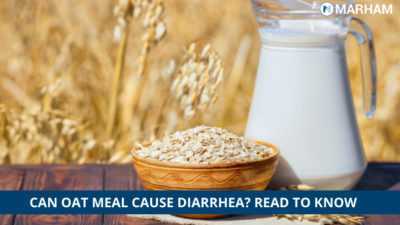Oat milk is vegan, nut-free, soy-free, and gluten-free, and is a well-liked alternative to traditional dairy milk owing to its variety of health advantages. It is simple to prepare at home. However, oat milk is not for everyone as it may cause stomach pain, gas, bloating, vomiting, nausea, and even diarrhea. Switch to low-sugar and gluten-free options to prevent diarrhea.
Highlights:
- Oat milk is a healthy alternative to regular dairy milk.
- Commercial oat milk with high sugar content and gluten can cause digestive issues, like diarrhea, in some people.
- You can add probiotics to your diet to flourish your gut flora and fight diarrhea caused by oat milk.
Oats as a Healthy Meal Option
Oats are a superfood with a host of health advantages. Oats are also suggested for weight loss since a diet high in fiber prolongs the feeling of being full, hence reducing the calorie intake. Starting with little amounts of oats may take some getting used to, but once you can your body is used to it, the benefits can outweigh the disadvantages.
Can Oat Milk Cause Diarrhea?
Although oat milk is a healthier alternative to regular dairy milk, the question arises; does oat milk cause diarrhea?
High Sugar Content of Oat Milk may Cause Diarrhea?
Commercial oat milk with a lot of added sugar can be unhealthy and cause diarrhea when combined with the high fiber level. Some brands of sweetened oat milk combine more sugar with more fiber. You may get diarrhea the first few times until your digestion gets adjusted to greater levels if your body isn’t used to processing the mixture.
Your chances of developing oat milk diarrhea are especially lower if you pick pure oat milk without added sugar.
Gluten is a Contributing Factor to Diarhhea
Gluten is present in some oat milk products. For those who cannot consume gluten, oat milk can result in diarrhea and an upset stomach. Read the label to make sure the oat milk is free of artificial sweeteners and gluten before purchasing.
Gluten-sensitive and celiac disease patients have trouble digesting oat milk, and even a small amount of wheat might result in diarrhea and upset stomach.
Click here to consult online with the best gastroenterologist in Lahore via Marham.
Why Does Oat Milk Make You Bloated?
Oat milk could make you feel bloated since it has soluble fiber in the form of beta-glucan. Gas and bloating are potential side effects of this soluble fiber.
Whole grains are rich in beta-glucan, a soluble fiber that has several health advantages. However, they have the potential to slow down your digestion by soaking up more water, which can cause bloating, flatulence, gas, and stomach discomfort.


Fix Oat Milk Diarrhea with Probiotics
Probiotics are helpful microorganisms that have been demonstrated to provide a variety of health advantages. As a result, probiotic foods and supplements have gained popularity as all-natural therapies for a variety of illnesses, including digestive problems like diarrhea.
How Probiotics may Treat and Prevent Diarrhea?
Probiotics live in your gut naturally in addition to being present in supplements and specific foods. They perform a number of crucial functions there, including preserving immunological function and safeguarding your body against illness and infection.
Diet, stress, and drug use are just a few examples of the many variables that can have both positive and negative effects on the bacteria in your gut, also referred to as the gut microbiota.
Also read: Do Probiotics Help with Diarrhea?
Irritable bowel syndrome (IBS) and digestive symptoms like diarrhea are more likely to occur when the usual population of probiotics is disrupted and the makeup of the gut bacteria becomes unbalanced. Diarrhea is defined by the World Health Organization as “three or more loose or watery stools in a 24-hour period.” While persistent diarrhea lasts 14 days or longer, acute diarrhea lasts less than 14 days.
Best Types of Probiotics for Treating Diarrhea
There are many different kinds of probiotics, but evidence suggests that supplementing with a handful of them is most effective in treating diarrhea. The most efficient probiotic strains for curing diarrhea, according to the most recent scientific research, are those listed below:
Licobacillus rhamnosus GG (LGG):
This probiotic strain is one of the most popular ones to supplement with. One of the best probiotics for treating diarrhea in both adults and children, according to research, is LGG.
The fungus Saccharomyces boulardii:
An advantageous type of yeast called S. boulardii is frequently seen in probiotic supplements. It has been demonstrated to treat infectious diarrhea and diarrhea caused by antibiotics.
The probiotic Bifidobacterium lactis:
This may dramatically lessen the intensity and frequency of diarrhea in children by enhancing the immune system and protecting the gut.
Licobacillus casei:
Another probiotic strain that has been investigated for its anti-diarrheal properties is L. casei. According to several studies, it can treat both infectious and antibiotic-associated diarrhea in both children and adults.
Read this article to know everything about diarrhea.
Final Notes
By replenishing and maintaining healthy gut flora and rebalancing an imbalance, probiotic supplements may help treat and prevent some types of diarrhea. By competing for nutrients, enhancing the immune system, and altering the intestinal environment to make it less favorable for pathogenic activity, probiotics combat pathogenic microorganisms.
Studies have shown that probiotic supplements can help both children and adults avoid and treat several types of diarrhea. Click to make an online appointment with the best gastroenterologist in Pakistan via the Marham app today!
Can’t Find The App
| Android | IOS |
|---|---|
  |
  |
FAQs
1. What can you eat for breakfast if you have diarrhea?
Low-fiber BRAT foods can assist to firm up stools because they are low in fiber. Additionally rich in potassium, bananas restore nutrients your body has lost as a result of diarrhea. You can also include oatmeal, boiled or baked potatoes (peeled), or roasted chicken without the skin, according to Dr. Kirby.
2. Can a probiotic fix diarrhea?
In actuality, probiotic supplements have been demonstrated to both prevent and treat specific types of diarrhea in both children and adults. By replenishing healthy gut flora and reversing an imbalance in the gut microbiota, using probiotics may help prevent and treat diarrhea.

